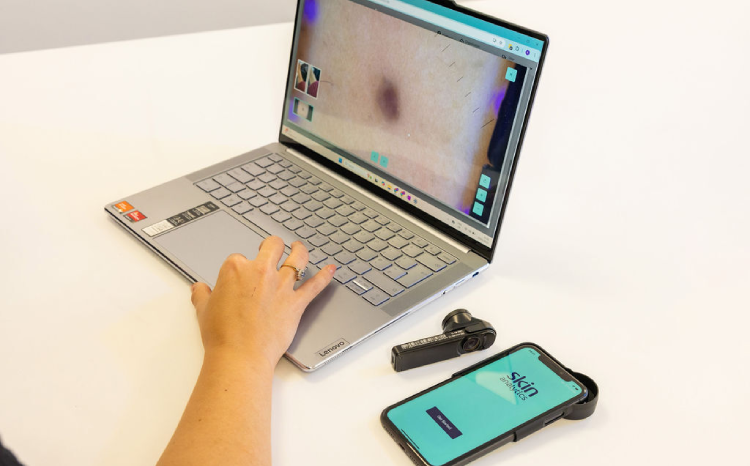The Rise of AI in Skincare: How Artificial Intelligence Is Shaping the Future of Skin Health
- dranataliamoore
- Nov 17, 2025
- 3 min read

Introduction: AI Is Transforming Skincare—But How Safe and Effective Is It?
Artificial Intelligence has rapidly entered the world of skincare, promising faster assessments, personalised routines and enhanced diagnostic accuracy. From “smart mirrors” to AI-driven at-home devices, the technology appears to offer a revolution. But in clinical practice, where accuracy and safety are paramount, how much of this technology is truly ready? And what role should AI play in helping patients understand and improve their skin?
As a GP and aesthetics clinician, I’ve witnessed the benefits and limitations of AI in real-world settings. Here’s what patients should know.
How AI Is Being Used in Skincare Today
1. AI for Skin Lesion Triage (NHS Dermatology)
Within the NHS, AI systems already support clinicians by analysing high-quality images of skin lesions, mainly moles that may be cancerous. The technology can help to rule out normal lesions, reducing unnecessary referrals.
However:
It is primarily used as a screening step, not a final diagnosis.
Delays may occur because images must be captured by trained staff and processed through multiple assessment stages.
AI cannot yet replace a consultant dermatologist; it simply prioritises cases.
This is crucial because the consequences of missing a serious lesion would be severe. AI therefore acts as a filter—not a substitute. That is why, in our clinic, we rely on face-to-face examination.

2. AI Skin Analysis in Cosmetic Dermatology
In aesthetics clinics, AI-based imaging systems are increasingly used to:
Evaluate hydration levels
Assess deeper pigmentation or sun damage
Visualise fine lines, wrinkles and skin laxity
Highlight underlying skin concerns that a patient may not notice
These systems can produce detailed visual reports. However, an experienced clinician can identify most concerns through a thorough examination. AI is best viewed as a visual tool to help patients understand their skin, rather than a diagnostic authority.

3. At-Home AI Devices: Useful or Risky?
A growing number of consumer devices use AI via smartphone apps to adjust treatment intensity in real time or interpret skin changes. While this sounds promising, there are significant limitations:
Image quality from consumer devices is poor, reducing AI accuracy.
Treatments delivered at home are far less powerful than clinical-grade equipment.
Users may place too much confidence in an AI recommendation and miss something serious.
I’ve seen patients self-diagnose rosacea or ageing concerns with at-home apps, only for us to discover an entirely separate and potentially serious lesion. This is where AI’s limitations become dangerous.
Why AI Cannot Replace an Expert Clinician
AI currently analyses only what it sees in an image. But a correct dermatological diagnosis relies on far more:
Lifestyle factors
Medical history
Hormonal influences
Past treatments
Family history
Environmental exposures
Subtle clinical signs not visible on photography
No artificial system can integrate this context in the way a trained clinician does.
Even in aesthetics, treatment plans require a deep understanding of the patient—not just an image.
If you have any concerns or goals for your skin, we recommend you book a consultation. In this, we do an in-depth in-person skin analysis and combine this with a deep dive into your lifestyle and internal health. Together, this produces a bespoke skin treatment plan.

What Skin Concerns Can AI Help Assess?
Pigmentation
UV damage
Hydration levels
Pore size and texture
Early signs of ageing
Redness and inflammation
Moles (in highly regulated medical environments)
But AI cannot safely diagnose:
Skin cancer
Pre-cancerous lesions
Many inflammatory skin diseases
Underlying medical causes of skin changes
Conclusion: AI Is a Powerful Tool—But Only When Used Safely
Artificial Intelligence is a promising addition to skincare diagnostics. It can support clinicians, speed up assessments and help patients visualise their skin health. However, AI is still in its early stages and lacks the contextual understanding required for safe, definitive diagnosis.
At-home AI devices may be useful, but they should never replace a full clinical examination, especially if a skin concern persists or changes over time.
The future of skincare will combine the efficiency of AI with the judgment, expertise and holistic understanding of trained medical professionals. Again, we remind you to book an in-person consultation to achieve your skin goals or tackle any issues you may have.



Comments